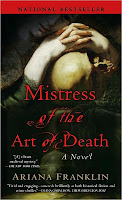 First, in the interests of encouraging others to waste time online, you can now find me on Twitter, not that I have anything particularly interesting to say there.
First, in the interests of encouraging others to waste time online, you can now find me on Twitter, not that I have anything particularly interesting to say there.
Today is the birthday of Isambard Kingdom Brunel, born 1806, possibly England’s greatest engineer, whose masterpieces like the Great Western Railway, the Thames Tunnel and the Clifton Suspension Bridge are still in use today. He was the inventor of the first propellor-driven ocean going iron ship, the SS Great Britain.
It is also–and I hope Megan wasn’t planning to blog about this exceptionally important date–almost the anniversary of another important date, April 10, when, in 1633, bananas first went on sale in London.
You can imagine–or at least, I can–the bemused discussions that took place regarding the fruit. I think we should throw the squishy part away, it’s probably gone bad…Too bloody expensive–quick, they’re not looking, put one in your codpiece…
The banana was first introduced to North American in the 1870s and an early, helpful publication, A Domestic Cyclopaedia of Practical Information stated: Bananas are eaten raw, either alone or cut in slices with sugar and cream, or wine and orange juice. They are also roasted, fried or boiled, and are made into fritters, preserves, and marmalades.
Banana marmalade? Jam? And it still doesn’t explain if you’re meant to consume the whole thing, the inside, or the outside, which I’d think would be the most helpful hint of all.
And now, I have decided to do an about face. I was wrong, I admit it. Jane Austen is a romance writer. I’ve been thinking about this for some time, and here are the points which made me change my mind:
Secret babies. Willoughby (Sense & Sensibility) has a secret baby.
Cowboys. There are many rural settings. Harriet Smith, in Emma, has a beau who owns at least one cow, (we know because it’s Harriet’s favorite). Therefore, Robert Martin is a cowboy. Yeehah. And Knightley himself, a powerful alpha male landowner, has to be a ranch owner. Pam Rosenthal blogged persuasively over at the History Hoydens that most of Knightley’s land has to be enclosed and is therefore grazing land.
 Navy Seals. Close and almost a cigar–Persuasion is rife with manly men in uniforms, the cream of the Royal Navy, muscles rippling beneath their skin tight uniforms.
Navy Seals. Close and almost a cigar–Persuasion is rife with manly men in uniforms, the cream of the Royal Navy, muscles rippling beneath their skin tight uniforms.
Sex. Who can forget the torrid sex on page 47 of Mansfield Park?
Alpha males. Yes… the glowering simmer of Mr. Darcy (Pride & Prejudice), the sinuous grace of Edward Ferrars (S&S), the riveting description of Mr. Collins as he masterfully handles the English Book of Common Prayer (P&P), Captain Wentworth’s mainmast, and Knightley, see above.
TSTL Heroines. Catherine Morland (Northanger Abbey, with the added bonus of being a TSTL heroine in her nightgown).
Can you think of any other examples? Let us know!





